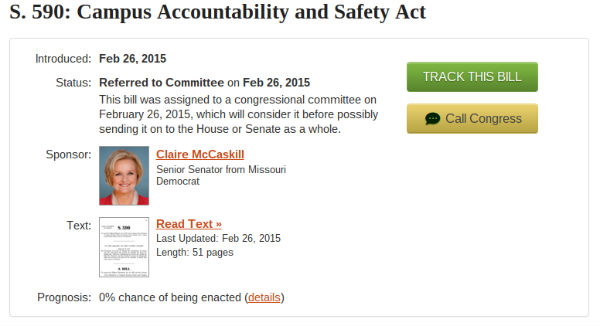
Some people are making a fuss over a draft plank in the GOP convention platform that says law enforcement should always investigate campus rape (i.e., criminal) allegations.
Here’s how it reads:
Sexual assault is a terrible crime, and we commend the good-faith efforts by law enforcement, educational institutions, and their partners to address that crime responsibly. Whenever reported, it must be promptly investigated by civil authorities and prosecuted in a courtroom, not a faculty lounge. Questions of guilt or innocence must be decided by a judge and jury, with guilt determined beyond a reasonable doubt. Those convicted of sexual assault should be punished to the full extent of the law. [see bottom of image below]
This bathroom-related language remains in the GOP platform pic.twitter.com/HItl8oyLu6
— Zeke Miller (@ZekeJMiller) July 11, 2016
You can watch the specific discussion on C-SPAN, with delegates offering various amendments (h/t Ashe Schow); one delegate reaches back to O.J. Simpson beating the rap on murder charges to justify a low evidence standard in a college proceeding.
Lest you think this platform language is just more evidence of a “war on women” by the GOP, keep in mind that a bipartisan bill was introduced in Congress last month that also advocates a law enforcement approach to rape.
Fixing the ‘uneven patchwork of laws’ on rape kits
The Survivors’ Bill of Rights (HR-5578) is sponsored by Republican Rep. Mimi Walters and Democratic Rep. Zoe Lofgren, both of California. It was introduced less than three weeks after the much-criticized rape verdict against ex-Stanford student Brock Turner, though its provisions don’t appear to remedy any perceived deficiency in that case.
The bill is under 10 pages long, it passed the House Judiciary Committee last week on a voice vote, and it can be summed up in one clause: equal treatment in the federal courts for those who report rape, regardless of where they live. (It has a Senate companion – S-2566 – that is dominated by Democrats but hasn’t moved in committee since its February introduction.)
MORE: Only the online mob wants to brutalize Brock Turner
Walters blamed an “uneven patchwork of laws” and “lack of substantive rights for sexual assault survivors” for depriving them of “full access to the justice system,” in a press release on the bill:
This legislation is so important because it ensures those rights in the federal criminal justice system and will set an example for states to adopt similar procedures and practices.
https://twitter.com/RepMimiWalters/status/751079856738369540
The legislation would give those who report sexual assault the right to a sexual assault evidence kit, written notification before a kit is destroyed, an opportunity to request preservation of a kit and to be informed of “important results from a forensic examination.”
Rape-kit backlogs are perhaps the worst kept secret in the criminal justice system, so anything that gives women more confidence to come forward – the promise that evidence will be properly kept and used for its intended purpose – is a win for justice.
The House bill would also create a “joint working group” convened by the attorney general and Department of Health and Human Services on best practices related to care for “sexual assault survivors” (a term used throughout the bill to denote alleged victims) and preservation of forensic evidence.
It debuted with 20 cosponsors, including the chairman and ranking member of the Judiciary Committee. Twelve of the 20 are Democrats.
Going nowhere fast
It would seem that the fast-track nature of this bill – less than a month from introduction to committee passage – and wide support in a fractious House has spooked the backers of a measure that has been languishing for almost a year and a half, one that largely ignores the legal system in its college-focused approach to rape.
The Campus Accountability and Safety Act (S-590, HR-1310), which provides no due process protections beyond those already promised by a college, has not moved in either chamber this year – indeed, the House version never got a hearing.
MORE: Bernie jumps on pro-accuser bill, goaded by Hillary
The Senate version’s has only picked up three sponsors so far in 2016 and only three in the second half of 2015. Its lone hearing was nearly a near ago, and its best moment since was Sen. Bernie Sanders signing on as a cosponsor (ending a two-month sponsor drought) the day after his then-Democratic rival Hillary Clinton said she believed all rape accusations.
Suddenly last week, the go-nowhere House version – which (like the Senate version) has a zero percent chance of being enacted – picked up four cosponsors in a single day, the highest tally in its sad history. It had collected a total of six earlier in 2016.
Why this sudden flurry? I wondered, so I asked a due-process advocate, who noted the recent introduction of the bipartisan rape-kit bills and speculated the CASA sponsors “wanted to regain the appearance of having the legislative momentum” before the House goes into recess this week.
But it’s not momentum if you’re just going in a slowly expanding circle. It appears that lawmakers who put their faith in the college system – thoroughly riddled with conflicts of interest – to provide credible findings in any given sexual-assault case are leading a losing, credulous coalition.
Lawmakers who want to show their constituents results that improve the justice system – rather than smoke and mirrors that undermine it – would be wise to look at the Survivors’ Bill of Rights.
MORE: Due process bills have better odds than pro-accuser bills
Like The College Fix on Facebook / Follow us on Twitter
IMAGE: JusticeRemains/Flickr







Please join the conversation about our stories on Facebook, Twitter, Instagram, Reddit, MeWe, Rumble, Gab, Minds and Gettr.